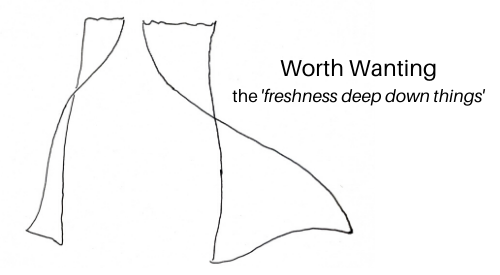
If there were to be a new morality of mutual aid as the highest principle, upon what should we ground it? A morality is not just assenting to a new principle but a new way of thinking about reality and how it is constituted, in other words, a metaphysic.
We think of the ‘physics’ of the term ‘metaphysics’ as the study of all that goes on in the material world, the forces and changes constrained by time, space and number, all scientific and practical knowledge pertaining to physics, yes, but also chemistry, biology, and sociology, the ‘how it works’ of things, then ‘metaphysics’ is about a different set of questions: what kinds of thing exists at all and what it is like to exist.
To study metaphysics at all begs the obvious and insistent question: Why existence at all? Not why in the causative, but in the purposive sense: to what end? or what’s the point? Put another way then, we can think of physics as the study of how we get what we want and metaphysics is of why existence is hard, but yet worthwhile suffering.
And let’s not kid ourselves: existence, our existence certainly, is one of inevitable travails and dilemma, of dreads and regrets, of confusions and perplexities, of loss, failure and ultimately death, of suffering, in short. If there is a ‘yes, but’, we look to metaphysics to supply it.
There has always been a tension between how things work questions and what the point questions, but once they were more integrated in a single project than they are now, more compatible, indeed conversant, less mutually exclusive. The how do things work questions generate explanations and based on these, prescriptions. The to what end questions are not about how we make decisions but what decisions are worth making. And I mean worth not just an acknowledgement of mere value but of value as motivation, not just a justification, but an activating attraction.
Concerning most of our daily affairs, the repetitive requirements of life, having an explanation is as good as undertanding the point, but with regard to the most fundamental matters: our lives, our relationships, life as a whole, the cosmos as a whole, for all these, bare explanation, small scale why answers, is inadequate, failing to account for the weight of existence and the way it impresses, intrigues or touches us and how we are to respond to these aspects of primal reality, these things that exists. For the simple fact of the existence of anything, indeed existence as such, being qua being, implicitly for beings such as ourselves, raises the what’s the point question, why all the work of complex causality?
This is not Aristotle’s final cause, teleological (or teleonomic), but one that transcends causation, transcends explanation. All the work of doing, making, when it would be so much easier not to exist, never to have existed, not ever threatened with the burdens of existence. Our own non-existence is barely conceivable; our never having been and never going to be is just word play, inconceivable. We, all of us, the whole shebang, are trapped in existence obliged to wrestle with constraints and obstructions just to do what we are compelled to do. No wonder Job’s ‘curse the day I was conceived.’ He was someone struggling to grasp the point of it all.
For most of us, there’s enough momentum (or inertia) in continued existence to justify not stopping. Also, the incessant struggles of existence seem to make what is the point of existence questions pointless. Also it’s that case that we find here and there, doing this and that, convincing and compelling hints and teasers of ultimate pointful worthwhileness. Also, we have philosophies and religions devoted to proclaiming the point and providing it to any interested to inquire.
But since at least the beginning of the modern age, the realm of exploration of how things work and why existence matters at ll, our individual, our common, our cosmic existences, have divorced, as in many such cases, one partner goes on to great success, and the other struggles and perhaps sinks into despondent dysfunction, and disregard. Physics has flourished; metaphysics has floundered.
Any new morality has to be based on a new and good answer to the question: what is the point? How we answer that question shows us what behaviors we need to adopt, what revisions we need to make in our assessments of things around us.
By raising the question (inevitable) of existence (as such), metaphysics is our goto realm of exploration of worthwhileness. Whereas in the physics realm, discoveries are empirically verified, in the metaphysical realm, discoveries have to not only take into account what physics establishes but to integrate that into an account of the point of it all, the ‘why bother?’ or ‘so what? of physics at all.
Every creation, every new and good thing, takes a stand on the question: it is the point not only of itself, but of the effort and risk of producing it, and of the reckless impulse to crack the egg of non-existence that some particular unprecedented thing might come to be.
All this said, I endorse the suggestion that we adopt a new morality if we want to survive as the human beings we are. But like any promulgated laws, the efficacy is grounded in a new metaphysics which captures the imagination of the people. Freshnessism is my offering.
The question to ask of any metaphysical point is whether it, in fact, makes existence, despite everything, worth wanting. What is it about existence that makes it preferable to non? Any answer is disputable, but no serious answer is refutable. What it has to be is intrinsically convincing and compelling.
The joy of X (istence)
What existence allows (that nonexistence does not) is creation as an act, and creation as a ongoing state of creativity. The point, as far as we are concerned, is bring new and good things into being. We do this regularly when we encounter, so the ultimate point is on and on encounters, of each with our peer others, and freshness with all the mundane realm through all space, through all the past, and on into an indefinite not yet.
The phrase ‘the point’ can suggest convergence on a final and fixed form, and so we may think the point is attainment of a a simple, single, static state of affairs, eternal because nothing changes, so time can’t be measured.
If, however, everlasting, open-ended creation through encountering is the point, however, then there is always something to do and always something to look forward to, and that is one aspect of its attraction.
In our encounters here and now, we are blessed sometimes to see or know in more than one way at once, that is, to see the particular and the universal, or the past and present, or the cozy and the expansive, or the literal and the suggested, or mine and yours, at the same time. Now these experiences of multiple perspectives are often intermittent and rapid togglings, but the point is that they become continuous and simultaneous, layered superpositions of point of view. Another attraction.
Finally, in our encounters now, we explore multiple affinities with the other, but suggest other affinities with other others, and between them and their others, on and on, so that we sense in this vast network of linkages the unity of all the world and all the worlds, and ourselves contributing participants and appreciative spectators.
Anticipation of what is to come, apprehension of the multiplicity of points of views, appreciation of the wholeness of the cosmos: this is the joy that calls us into existence. This is the point.
